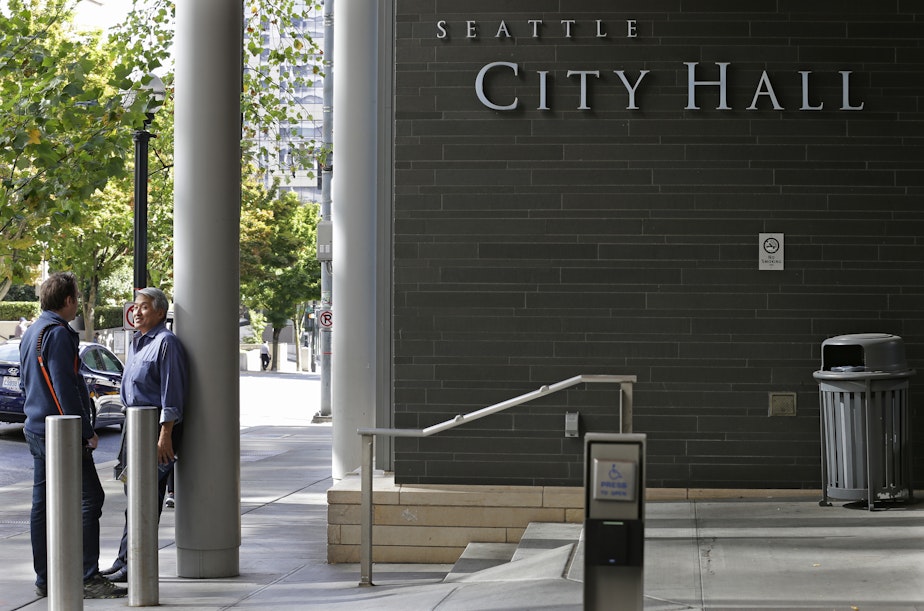SHOCK VOTE: Seattle City Council rejects drug enforcement policy 5-4

Seattle will not be enforcing a state drug law that would have allowed the city to prosecute people for using illegal drugs in public. That leaves the county with the sole authority to prosecute these cases.
After a raucous public hearing that unfolded over four hours Tuesday evening, a divided council rejected a measure to fold the state's new drug possession law into Seattle’s municipal code.
The proposal, which was rejected 5-4, would have made possessing illegal drugs or consuming them in public a gross misdemeanor in Seattle, empowering the city attorney to prosecute those cases in municipal court for the first time.
The city bill encouraged authorities to offer the option of entering drug treatment or other diversion programs instead of going to jail. But critics have said the city’s existing treatment infrastructure and diversion programs would be inadequate to meet demand under the new policy. They also expressed concern that police and the city's attorney, Republican Ann Davison, would prioritize jail over diversion programs.
Despite the council's vote, the new state drug law takes effect July 1. It makes simple drug possession and use a gross misdemeanor in Washington punishable by up to 180 days in jail or a fine of $1,000, with penalties increasing after two offenses. It also encourages diversion instead of jail.
Seattle police will be able to arrest people under this state law, but the city attorney will not have authority to prosecute those cases. The King County court system would have jurisdiction over such cases, according to a memo from Seattle City Council staff.
Sponsored
The “no” votes at Tuesday’s council meeting were Andrew Lewis, Lisa Herbold, Teresa Mosqueda, Tammy Morales, and Kshama Sawant. The four “yes” votes were Debora Juarez, Sara Nelson, Alex Pedersen, and Dan Strauss.
Lewis, whose district includes Seattle’s downtown neighborhoods, shocked the meeting’s attendees with his vote. Lewis is running for re-election amid a surge in overdose deaths in his district, which is home to some of the city’s most visible drug problems.
A former assistant city attorney, Lewis said he was concerned that the council had not taken enough time to consider the question of diversion programs as alternatives to jail.
"I just can't do it today," he said during an emotional moment on the dais. "I can't."
In 2022, 661 people in King County died of drug overdoses that included fentanyl, according to data from the Medical Examiner's Office.
Sponsored
Lewis and other council members said Davison's recent decision to end a jail diversion program known as Community Court made them skeptical about her commitment to such services.
Some of the drug proposal's fiercest critics called the measure a new "war on drugs" and said it would disproportionately harm people of color.
“Our city is proposing criminalizing those that are too poor to have a home and those that are ill,” said Sarah Robbins, senior policy manager at the Seattle King County Coalition on Homelessness, said during the hearing.
Others said the city should focus instead on addressing root causes of the drug crisis, such as poverty.
“We need to show our neighbors that we will focus on real solutions like diversion, treatment, and housing. That's how we create safety for Seattle,” said Tammy Morales, who represents Council District 2.
Sponsored
Supporters expressed concern about public safety and the city's drug crisis.
"We must use every opportunity to get people into treatment, and this legislation will provide one more way to do that,” said Randy Banneker, a representative of Seattle King County Realtors.
“Sometimes the front door to treatment, whether we like it or not, is the courthouse," said City Council President Debra Juarez, who also voted yes. "Is it the best alternative? No. It's one alternative.”
Kylie Rolf, an advocate for the Downtown Seattle Association, said, “I hope that most can agree that doing nothing is inhumane and unacceptable."
After the vote, Mayor Bruce Harrell released a statement that read, in part, "It’s unacceptable for people to consume illegal drugs in public spaces – not only is it unhealthy, it makes communities feel unsafe and unwelcome.
Sponsored
"Regardless of this vote, our focus will remain on arresting the dealers and traffickers bringing this poison into our communities, along with advancing new and innovative approaches to ensure those in need receive the treatment they deserve."
City Attorney Davison lashed out in a statement on Tuesday night, saying she was "outraged."
"Our buses, parks and sidewalks are filled with individuals who need help getting into treatment,” Davison said.
In an interview with KUOW ahead of the council's vote, Davison responded to concerns about her commitment to diversion programs.
"This is not a return to the war on drugs," she said of the proposal, just hours before it died. "It is about how do we get individuals into treatment and how do we make our public spaces safer."
David Hyde contributed to this report.




